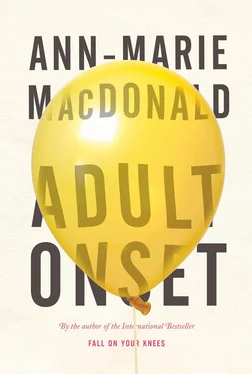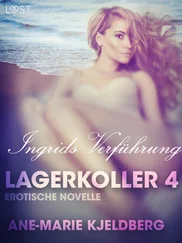She has let the German go. There is no need for help, she just has the one child at home during the day.
It is standing on the other side of the coffee table, in diaper and undershirt, howling. Rigid. On its cheeks, taut drops look to have burst straight from its face. Dolly closes her eyes. As long as she stays lying down, nothing bad will happen.
•
Mary Rose leaves Room UL230B and is immediately lost. Did she come up the orange elevators or were they yellow? She peers down a corridor, at the end of which stands a set of double doors, marked PROCEDURE ROOM. She sets out in the opposite direction, wishing she had thought to bring a sack of breadcrumbs, trying not to breathe too deeply. Perfectly clean words become queasy when used in a medical context: procedure … the euphemism taking on a quality it was calculated to conceal. She is not a fan of hospitals, but is grateful for the absence in this wing of the smell of disinfectant and rubbing alcohol; surgical smells that reawaken dread, make her shiver, and bring ghost-story tears to her eyes. The smell of piercing … She reminds herself that in fact the worst smell is that of hospital food; truly the bread — and applesauce and mushy peas — of sorrow. She has never understood why anyone would wish to make a career in a hospital. Her own mother was a Registered Nurse; an O.R. nurse to boot, having had no fear of blood.
She passes Mammography — at least she is to be spared the panini press today. She turns the corner, BONE DENSITY CLINIC. Is that what is behind the capricious pain in her arm? Is it perhaps not phantom at all, but a symptom of osteoporosis? More of “the riches of menopause”? Nothing showed up on the X-ray. Still, that was six months ago …
She feels like Detective Columbo from the old seventies TV series. Rumpled, blind in one eye and with a shambling gait, he was master of the false exit: just when the suspect thought the bumbling detective was leaving empty-handed, Columbo would pause in the doorway, then turn and say, “You know, somethin’s been botherin’ me at the back of my mind …” And nail the perpetrator.
She spots an emergency exit with a stairway symbol and a warning, ALARM WILL SOUND IF OPENED. She opens it.
•
A different sound now. Ragged, moaning protest. No longer crying. Hot breath against her face. Smell of wet cotton, urine. The word, a dry entreaty, “Mummy.” Repeated. Gathering fresh urgency — rooted in a new source, a scorched place. She feels the small hand alight on her face, hot. There is the word again, accelerating, metal on metal, the word is going to catch fire, Mummy! Fingers probe her eyelid, push it open. The hand travels to her scalp and a fistful of her hair is pulled taut, her head yanked, the child is shaking her. She keeps her eyes closed. It takes all her strength, but she manages finally to roll over and face the back of the couch. After a while the blows to her back and shoulders cease. The child is incapable of actually hurting her, it is only two years old.
•
In all the years since her last bone surgery at fourteen, apart from the odd histrionic bump Mary Rose has never felt a peep out of her arm until recently. It soldiered on through a summer in the militia, through the rigours of theatre school, through countless drunken escapades and bouts of contact-improv, through two babies. Until last summer.
It was the first summer without Hil’s mum. Patricia had died of complications following minor surgery the previous fall. She was a beautiful woman with crystal blue eyes and a gracious manner — a woman who referred playfully to her husband as “the Doctor” but spoke reverently of their respective “realms”—hers having been at home with the children. Hil was grief-stricken, naturally … although at the funeral reception, Mary Rose had been shocked to hear her state bitterly to a childhood friend, “My mother died of a bad back.”
They had come to the end of their exhausting summer holiday on the east coast. Maggie was about to turn two and Matthew had suddenly gone into reverse, demanding diapers of his own. The shore was gentle, but a child can drown in an inch of water and the woods were full of bears and Lyme disease—
“No they’re not, Mister, not ‘full.’ ”
“ Ixodes scapularis has been migrating north, it just takes one tick.”
Moreover, the children might wander into the forest and die of exposure. “How?” asked Hilary, who had somehow managed to read an entire novel over the course of two harrowing weeks. They closed up the old hunting cabin and loaded the car while supervising their toddlers — perhaps her mother was right, Mary Rose was just too old for this game. Finally they were ready to head into Halifax for a last overnight with Hil’s dad and younger sister. Mary Rose went upstairs to lie down on the couch in her father-in-law’s den before supper and could not get up again for sixteen hours.
Everyone thought she was tired, but Mary Rose knew she was gone. She had dropped below some line. It was like the diagram in her high school science textbook of the earth’s crust in cross-section. Some distance down was the “water table.” She had slipped below the water table. Immobilized. Unable to blink, to sleep, she saw herself laid out and suspended in the ground. At some point she heard the family singing “Happy Birthday” downstairs, and remembered: today was Maggie’s second birthday.
Where was the switch? She had not known it was possible one day to lie down and never get up. Was this “hysterical paralysis”? Even if she did get up this time, it would remain possible in the future to be struck still. She had gone there now, there was an event trail carved out. A pathway.
Where was the switch? Daisy came in and face-butted her, mushy wet. Hilary plied her with juice. Hil’s father looked in on her. White-haired and tall, he was both the image of a 1960s television doctor, and a real one—“realish,” he liked to say. A psychiatrist. He pulled up a chair and gently inquired if she was “on something.” She almost answered, “The couch.” “No,” she said, “I’m just tired.” He nodded, then asked if she wanted “something.” Would he have slipped her a Valium on the spot? Hil’s mother had indeed had a bad back. There is a glass of wine, then there is a glass of wine with Percocet …
“That’s so kind, Alisdair,” replied Mary Rose, “but I feel better now.”
She loved her father-in-law, but was grateful not to have been the beneficiary of his modern methods back in the day. She wondered if he had ever administered shock therapy. At least he and Hil’s mother had never waged a campaign to turn their daughter “straight.” She packed up her hysterical parenthesis and put it behind her.
They got on with the trek west, stopping over in Ottawa as usual, where her parents lived in easy-listening air-conditioned comfort in a condo development called Corrigan’s Keep for reasons as obscure as those behind the various Vales, Heights, Castle Views and Downs that surround every North American city. The pain ambushed her on the second night in the basement guest suite. She woke up, surprised. The numbers on the clock glowed red: 2:00. She rose carefully so as not to disturb Hil — the mattress was like Gyproc on springs. Hil said it merely needed a layer of memory foam. Didn’t we all? She crept between Maggie in the Pack ’n Play and Matthew on the folding IKEA chair-bed.
She slipped into the bathroom and switched on the light. The mirror leapt into surgical view and there she was, crazy hair, sheet-wrinkled cheek. On her arm, the scars, the vein, no bruise.
Mary Rose was accustomed to the thousand cuts that maternal flesh is heir to. She had nicks on her fingers that took months to heal because she was always rinsing something at the sink; discovered bumps on her head while washing her hair, bruises on her legs while shaving, all in a day’s work — who has time to feel the bite of a coffee table on the shin when they’re breaking a toddler’s fall? It was unsatisfying, however, to endure pain without a mark to show for it.
Читать дальше












